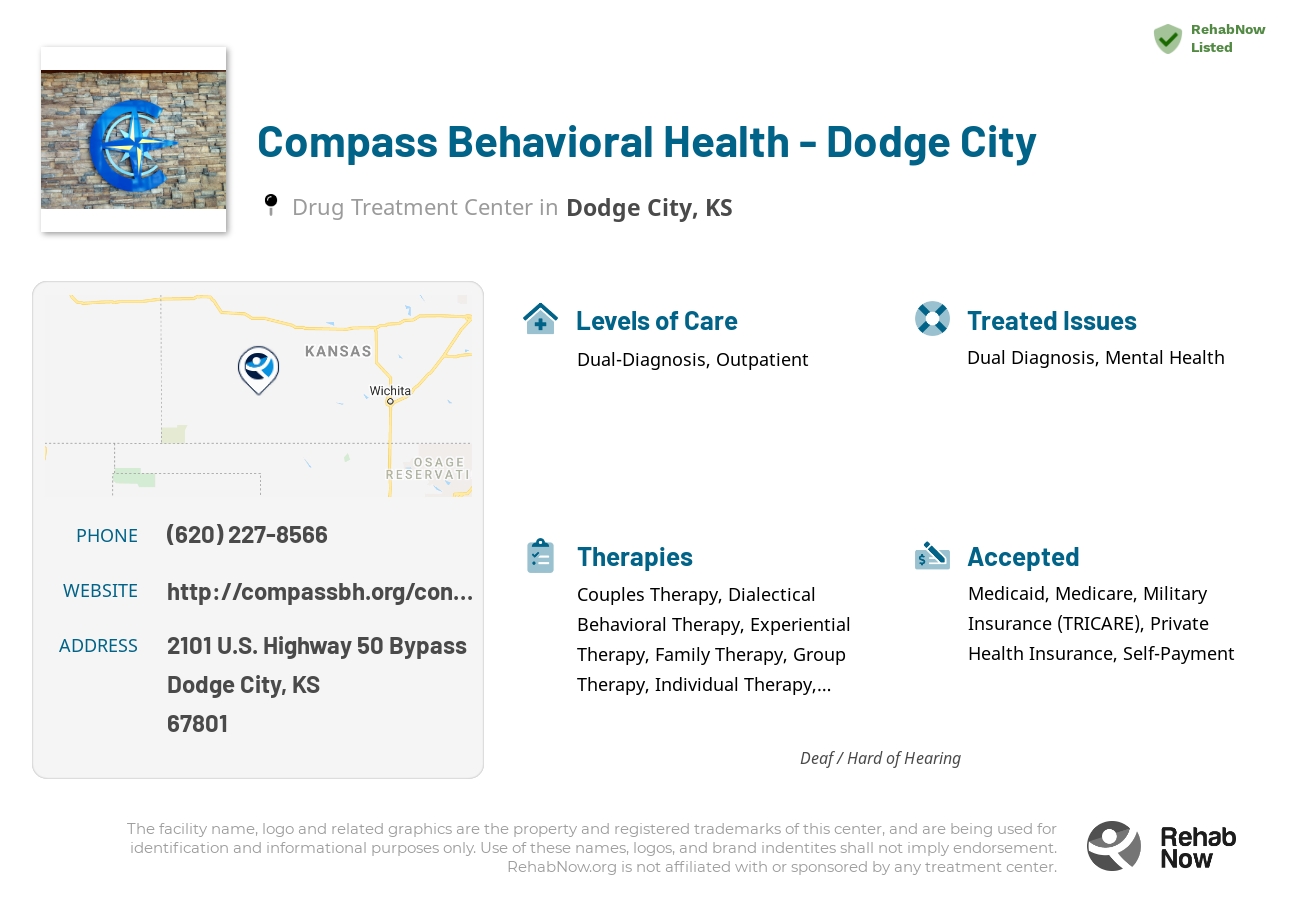Compass Behavioral Health - Dodge City
Drug Rehab Center in Dodge City, Kansas
Compass Behavioral Health - Dodge City in Dodge City, Kansas is an addiction treatment facility providing evidence-based programs and therapeutic services to individuals struggling with addiction and mental health issues, offering three levels of care and accepting private health insurance.
About Compass Behavioral Health - Dodge City in Kansas
Compass Behavioral Health - Dodge City in Dodge City, Kansas is an addiction treatment facility whose mission is to help those struggling with addiction and mental health issues. They offer a range of evidence-based programs to help those with dual diagnosis, mental health issues, substance abuse, and drug addiction. They have three levels of care, dual-diagnosis, outpatient, and aftercare. They accept private health insurance and are affiliated with CGI Communications.
Compass Behavioral Health - Dodge City provides a variety of therapeutic services to help individuals tackle addiction and substance abuse. They focus on evidence-based treatment, such as cognitive behavioral therapy, twelve-step recovery, holistic therapies, and individual and family counseling. Additionally, they offer relapse prevention, aftercare planning, and integrated treatment for co-occurring mental health disorders. They are accredited and licensed by agencies such as the The Joint Commission and The Substance Abuse and Mental Health Services Administration.
Genders
Ages
Modality
Additional
Conditions and Issues Treated
Individuals who are addicted to drugs and/or alcohol often have one or more co-occurring mental health disorders. Addressing both the addiction and the mental health problems at facilities like Compass Behavioral Health - Dodge City can be very beneficial for these individuals.
Common mental health conditions that often co-occur with addiction include:
- Anxiety Disorders – People with drug and alcohol problems often suffer from anxiety disorders such as panic disorder, obsessive-compulsive disorder, social anxiety disorder, and generalized anxiety disorder.
- Depression – One of the most common mental illnesses co-occurring with addiction is major depressive disorder.
- Attention-deficit hyperactivity disorder (ADHD) – Many people with drug and alcohol problems also suffer from ADHD.
- Bipolar Disorder – People with bipolar disorder are more likely to suffer from drug and alcohol problems than the general population, and vice versa.
Levels of Care Offered
This center offers a variety of custom treatment tailored to individual recovery. Currently available are Dual-Diagnosis, Outpatient, with additional therapies available as listed below.
Outpatient treatment can be considered the lowest intensity level of addiction treatment in Dodge City, KS. It is ideal for early phase addiction or lower intensity addictions. Compass Behavioral Health - Dodge City peer group support, 12-step programs, and individual counseling are likely to be involved.
Therapies & Programs
Individual therapy is ideal for addicts who want to focus on themselves. It can also be helpful for those whose withdrawal symptoms are exacerbated by the presence of other people.
Benefits of individual therapy are:
- Access to a personalized treatment plan that focuses on the individual needs of the addict
- More privacy during treatment sessions
- Better personal development through introspection
- Increased self-awareness regarding addictive tendencies in order to avoid relapse
- Greater potential for a long-term recovery plan
- Receiving professional advice and detox assistance from medical staff
Couples therapy is a treatment method used to help couples in which at least one member of the couple has a drug addiction. Couples therapy can be used whether the addicted partner is using drugs or in recovery. An additional benefit of couples therapy is that it can help make other types of treatment, such as 12-step programs, more effective.
Family therapy can help you and your family deal with old issues that may trigger substance abuse. The idea behind family therapy for drug addiction is that you are never fully healed from substance abuse until you’ve healed your relationship with your family, too. To get sober, you need to find a different way to cope with the pain in your life.
This is when a group of people in various stages of recovery meet up and discuss their experiences, triggers, successes, failures, and even alternative therapies! Unlike support groups where everyone already knows each other, group therapy is conducted along side outpatient or inpatient treatment at Compass Behavioral Health - Dodge City.
Trauma therapy is a clinical process that helps individuals deal with mental stress often caused by traumatic events. The therapist helps the person identify, understand and work through the problem. This is done with the help of talking about it in group or one-on-one counseling sessions.
Therapists use relaxation, role-playing, art, and music to help the person open up about what is bothering them. Some examples include:
- Talking about the traumatic event and how it affected them.
- Helping those who have PTSD to deal with their nightmares and recurring memories.
- Working with individuals to resolve the issues triggering the stress, whether seeing someone who reminds them of what happened or feeling helpless.
The individual is also encouraged to help others that are struggling with similar problems. This often helps them feel empowered and gives them hope.
Trauma therapy is not for everyone; it is usually reserved for people who have recently experienced a traumatic event and struggle to get over it. It is generally done for children, teenage victims of sexual assault, and war veterans.
Dialectical Behavior Therapy (DBT) is used by drug treatment centers across the United States to help drug addicts become sober. DBT is a type of Cognitive Behavioral Therapy (CBT) that combines traditional behavioral treatments with elements from DBT, including dialectics, distress tolerance, and interlocking issues. Some of the negative behaviors associated with addiction, such as impulsivity and mood swings, are addressed in DBT, while others like craving and isolation are not. It is commonly used to treat Borderline Personality Disorder (BPD) along with substance abuse disorders.
The four DBT modules are mindfulness, interpersonal effectiveness, emotion regulation, and distress tolerance:
- Mindfulness helps recovering addicts learn to identify and experience their emotions while realizing that they are not permanent.
- Interpersonal Effectiveness includes assertiveness, asking for what you need, and saying no while improving communication skills.
- Distress Tolerance has recovering addicts learn how to tolerate distress at the moment and avoid resorting to substance abuse.
- Emotion Regulation is used to identify, express and change emotions.
CBT is a psychotherapy approach and method. [ws-nap-name] people to examine how their thoughts, including habitual harmful and inaccurate thinking, affect their actions. CBT is based on the idea that rigid, inflexible thinking leads to poor stress management, which leads to emotional distress.
Similarly, CBT helps people identify and change negative behaviors. It makes you question your perceptions and ask if they are realistic. CBT asks people to examine their behaviors and emotional responses and how they affect their lives. CBT aims to change people’s thinking and behavior to lead a more balanced and healthy life.
Moreover, CBT has been shown to reduce anxiety disorders, depression, and symptoms associated with harmful thoughts or actions.
Patient Experience
Experiential Therapy at Compass Behavioral Health - Dodge City
Experiential Therapy is a type of therapy that involves activity to recreate situations that may have caused trauma or negative emotions. Experiential therapy at Compass Behavioral Health - Dodge City in Dodge City, KS can involve acting, props, arts and crafts, animal care or other tools that may be effective. This therapy is done on an individual basis and can help revisit and heal from past traumas. Trust between the therapist and individual is important for success. Experiential therapy can help you more closely become you and move through life positively and authentically.
Payment Options Accepted
For specific insurance or payment methods please contact us.
Is your insurance accepted?
Ask an expert, call (888) 674-0062
CGI Communications Associated Centers
Discover treatment facilities under the same provider.
- Compass Behavioral Health - Garden City in Garden City, KS
- Compass Behavioral Health - Ulysses in Ulysses, KS
- Compass Behavioral Health - Scott City in Scott City, KS
Learn More About CGI Communications Centers
Additional Details
Specifics, location, and helpful extra information.
Dodge City, Kansas 67801 Phone Number(620) 227-8566 Meta DetailsUpdated November 25, 2023
Staff Verified
Compass Behavioral Health - Dodge City Patient Reviews
There are no reviews yet. Be the first one to write one.
Dodge City, Kansas Addiction Information
About 42% of adults in Kansas have tried an illicit drug at some point in their lives. 12.4% of the state population uses illegal drugs and 4.5% abuse alcohol in a given year. 15.16% of all deaths in Kansas between 2008 and 2017 were caused by either drugs or alcohol.
The National Survey on Drug Use and Health (NSDUH) found that more than one-third of the population over 12 years old in Dodge City has used illicit drugs. Nearly 5% of people in the city reported using drugs in recent years. Additionally, there were over 6,000 arrests for drug-related offenses. It is important to do research before choosing a facility to ensure it is the right fit for you.
Treatment in Nearby Cities
- Medicine Lodge, KS (87.4 mi.)
- Goddard, KS (136.0 mi.)
- Manhattan, KS (213.1 mi.)
- Oskaloosa, KS (276.0 mi.)
- Derby, KS (153.3 mi.)
Centers near Compass Behavioral Health - Dodge City
The facility name, logo and brand are the property and registered trademarks of Compass Behavioral Health - Dodge City, and are being used for identification and informational purposes only. Use of these names, logos and brands shall not imply endorsement. RehabNow.org is not affiliated with or sponsored by Compass Behavioral Health - Dodge City.


